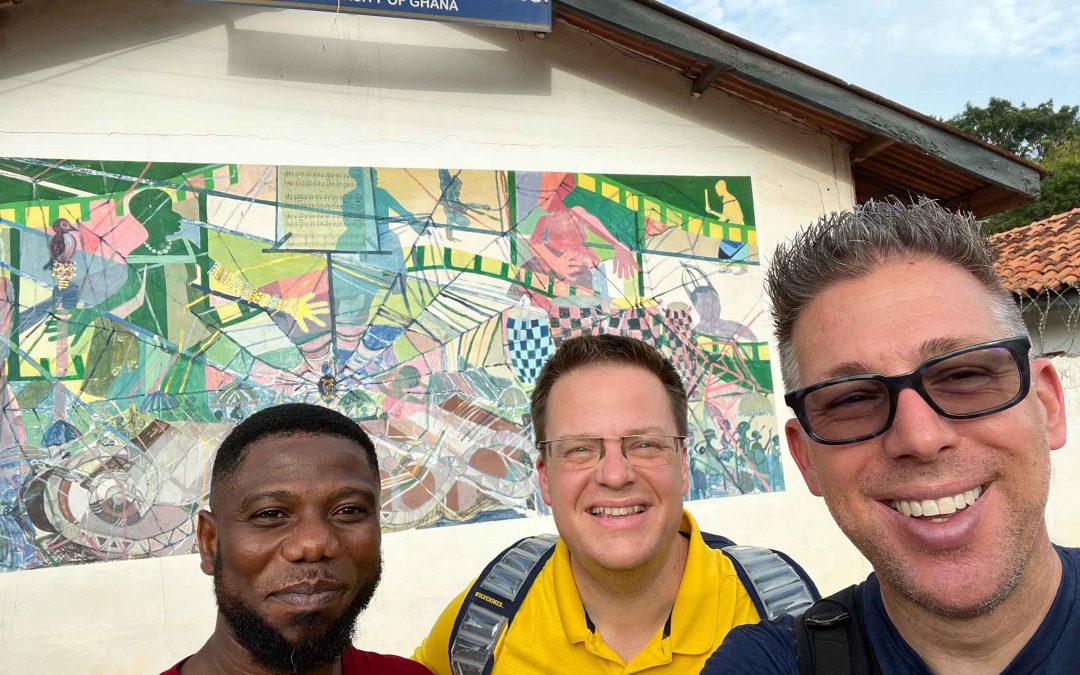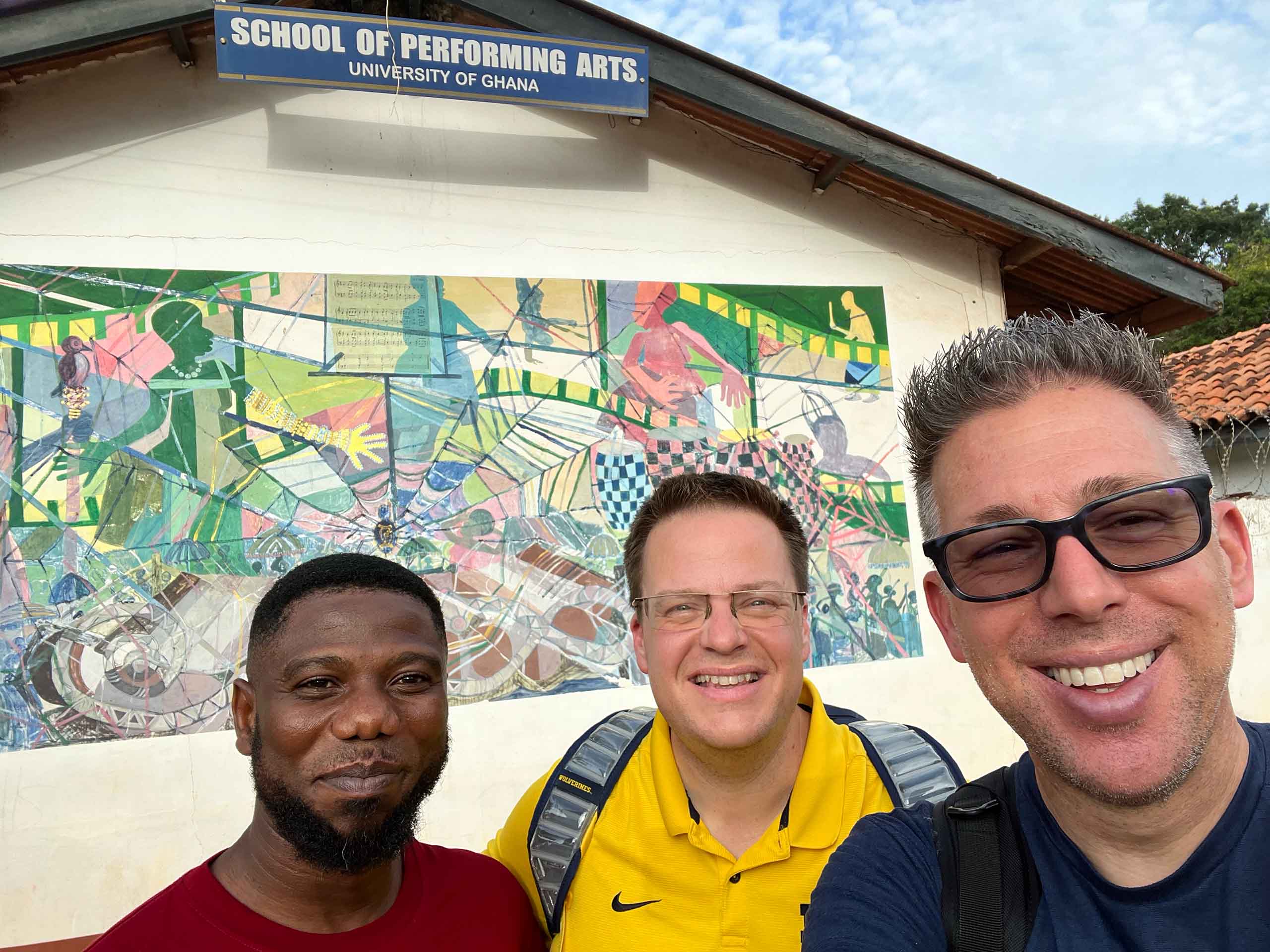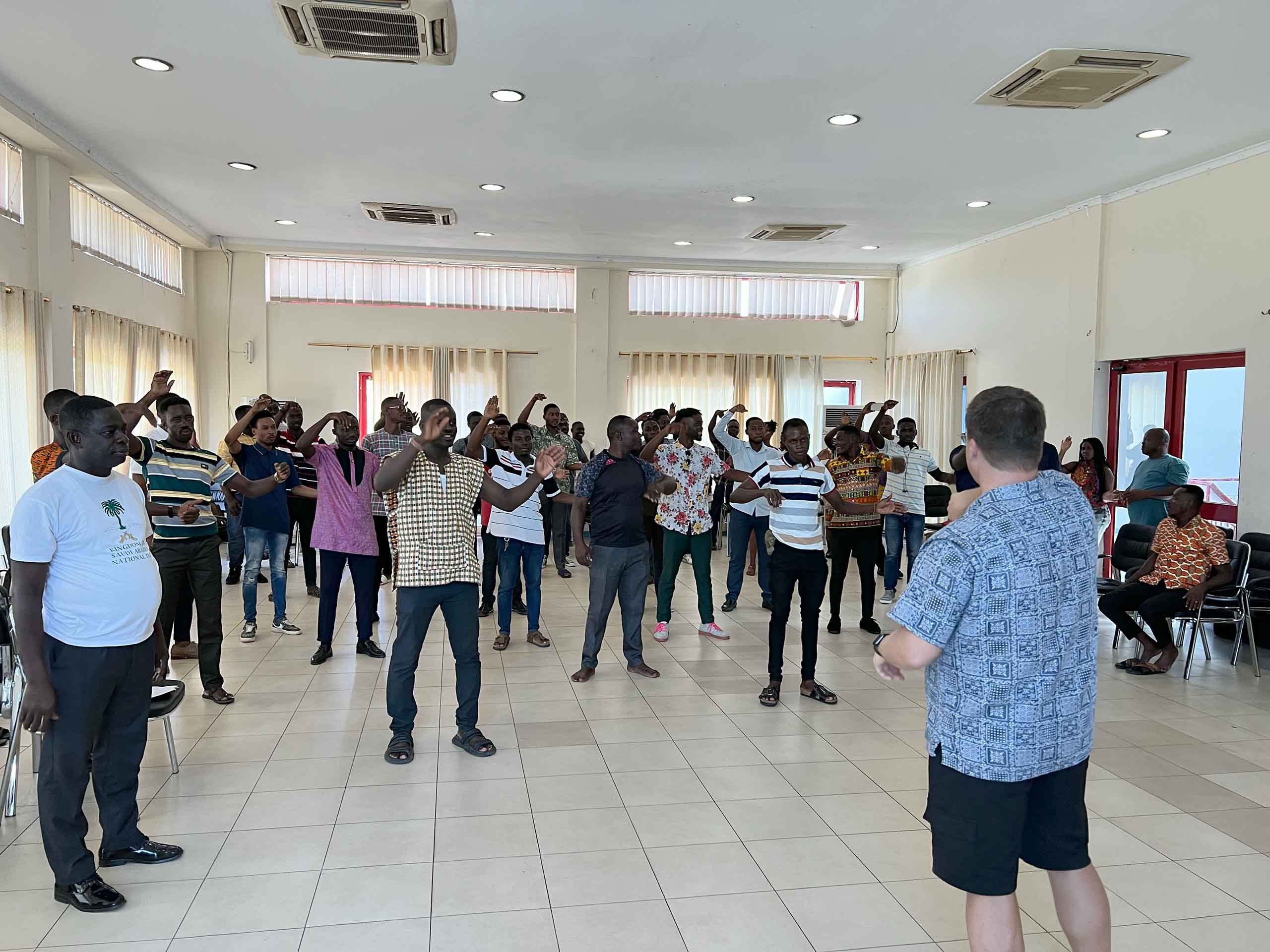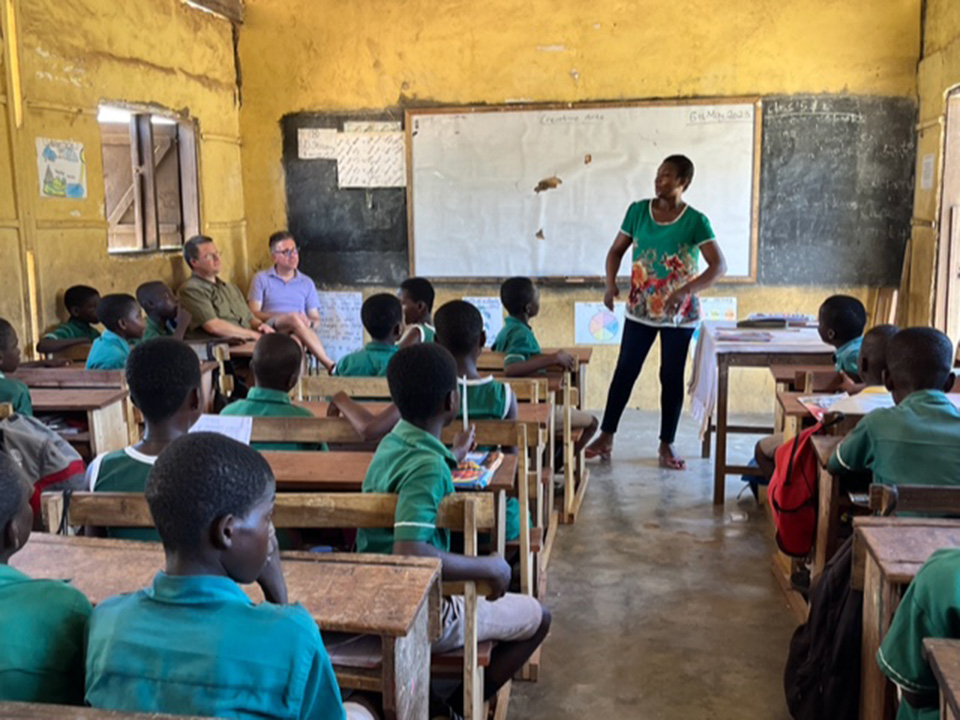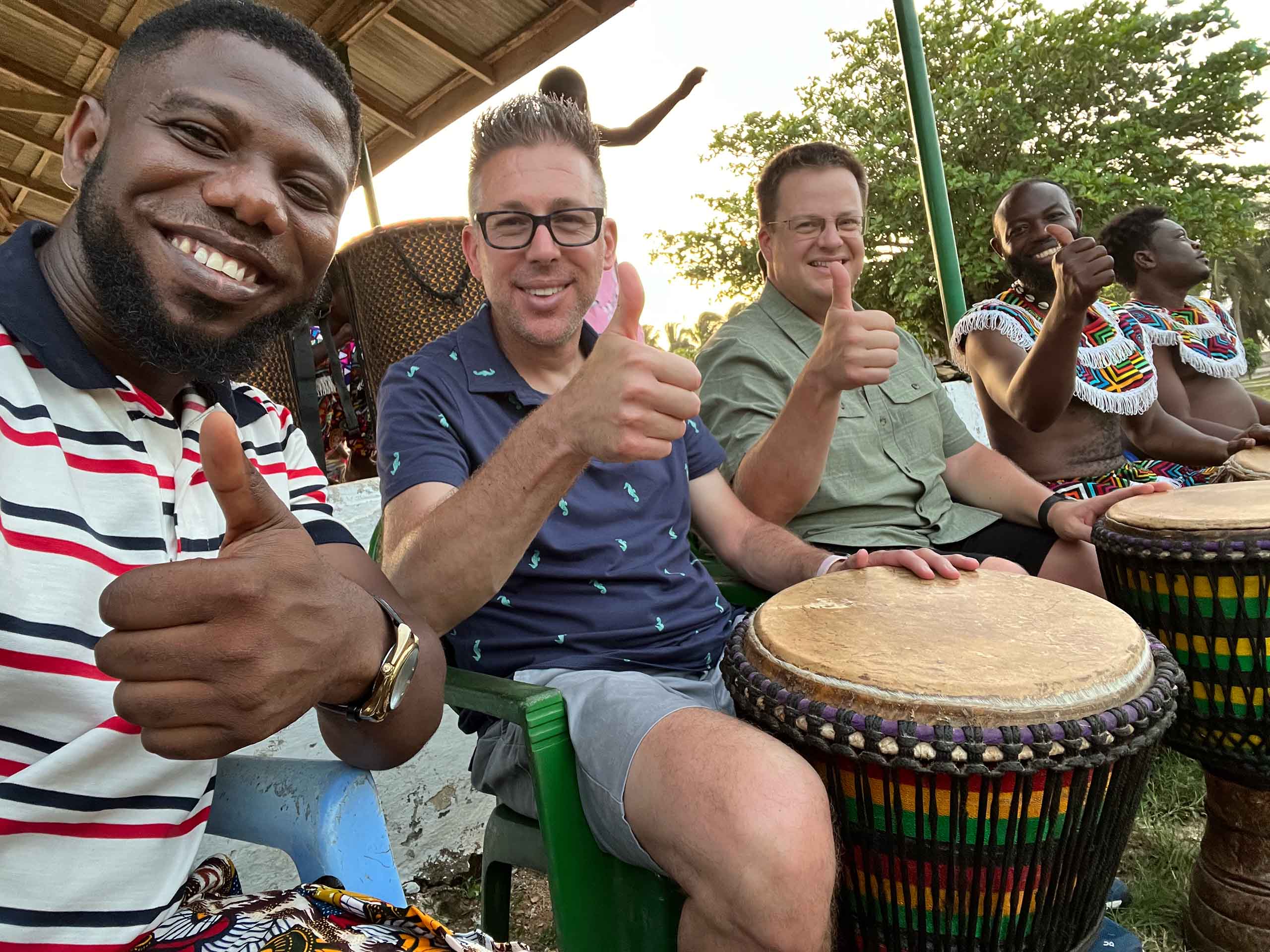Michigan Muse Summer 2023 > A Transformative Residency in Ghana
A Transformative Residency in Ghana: An Interview with John Pasquale and Richard Frey
By Judy Galens
In May 2023, John Pasquale (Donald R. Shepherd Clinical Professor of Conducting, director of Michigan Marching & Athletic Bands, associate director of bands, and faculty associate at the African Studies Center, LSA International Institute) and Richard Frey (lecturer of conducting and associate director of Michigan Marching & Athletic Bands) embarked on a one-week residency at the University of Cape Coast in Ghana. The first part of a multi-year initiative, the residency enabled Pasquale and Frey to engage in an unforgettable exchange of knowledge, culture, and friendship. In this interview, they reflect on the experience and its transformative impact on their lives.
How did this residency come about?
John Pasquale: Our colleague, Dr. John-Doe Dordzro, was an exchange scholar from the University of Cape Coast here at Michigan for six months last year. He and I connected at the very end of his residency here. We just went for coffee, and we were talking about how we do band here, how they do band there, and then we both felt, why don’t we take a look at a collaboration? We have so much to learn from each other. And that’s how it started.
What are the goals of the residency?
Richard Frey: The goals of the residency are multi-layered. The intention is not for this to have been a one-time visit, but that we would continue to go back over the next several years to build on the groundwork that we laid while we were there. The key thing for us was that it wasn’t just about teaching band or teaching conducting. It was for us to understand how band – and more broadly, how music – operates and exists in Ghana. And then seeing how that fits culturally and understanding their situation, so that next year and the years after can be tailored in a way that makes the most sense.
So going into our first visit, the goal was for us to get the lay of the land, essentially. Then we hope to work with conductors and wind band leaders from around the country, sharing ideas about teaching and how to work with an ensemble, including building on their instrumental techniques, the pedagogy of teaching each of the wind and percussion instruments, and the way we interact with the ensemble and lead rehearsals.
JP: There were two primary foci. One is research-based, just to get an understanding of how everything works. And then, secondly, how can we be effective in collaboration? How do we share ideas, and how do we bring ideas home? That kind of synergy is extremely important.
Now that we’ve been there, our goals have expanded slightly. Over the next four years, the goal is to create a music center through the University of Cape Coast, which will then ultimately expand to a regional music center, and then hopefully a national music center. We are planning to collaborate with professors and other music educators in the area to offer musical experiences to people outside of the academy. It can be instrumental and vocal music, drumming, and dancing.
What were your expectations of this trip beforehand, and to what extent did your expectations match what happened?
JP: My expectations were that we were going to experience really great ensemble music-making and classroom teaching, a beautiful culture in a great place, friendly people, and excellent food, and to tell you the truth, all of those expectations were met for me. From our experience, the people of Ghana are some of the nicest, kindest people I’ve ever met. They were extremely welcoming and excited to collaborate and share with us.
RF: One of the things for me, especially having not traveled to Ghana or West Africa before, was that I wanted to experience their culture and know the people and understand them in a real way. Over and over again, like John said, the people there were so gracious and welcoming and kind in every regard. It was really incredible.
What were your day-to-day experiences there?
JP: Our first day was spent getting the lay of the land, and that was a very meaningful experience, just to be able to be immersed in the culture, to see it, to smell it, to be a part of it, to taste it through their food, which was really delicious. We visited a slave castle [a structure used to imprison enslaved Africans before they were transported across the Atlantic]. And that was a transformative experience. It was a really tough place to visit, but it was important to experience. The smells were still there, there’s still the DNA in the dirt, in the cells. It was really moving in every way possible.
The next few days we were teaching a workshop, and we had participants from all over the country. Some came from six or seven hours away.
RF: We were in the south, right on the Atlantic in Cape Coast. The participants drove from the central and northern parts of the country to get there. And now that we’ve driven the relatively short 80 miles back to the airport in Accra, we know those are not quick, comfortable trips on interstate highways like we are used to in the States.
JP: The participants at our workshop were students from the University of Cape Coast and the University of Ghana. We had primary school teachers and many amateur conductors who are performers in the military, police, and prison bands. We had a wide variety of participants, and that was really great. And in those sessions we talked about instrument, ensemble, and conducting pedagogy. We showed them videos of the University of Michigan Marching Band along with our ensembles here in America, and they were a huge hit! We heard live performances. We took drumming lessons. I was a disaster. Richard was great.
I think the most meaningful experience for me, professionally, was our visit to a primary school (kindergarten through fifth grade). The classrooms had rotting concrete walls and metal roofs with holes in them. There were goats walking around and the only available bathroom was a large outdoor trash pit – open and uncovered – immediately north of the buildings. It was easily over one hundred degrees in the classroom we observed. I mean, conditions were difficult. But I’ll tell you what, it was some of the best teaching I’ve ever seen anywhere on earth. It was so inspiring. I will never forget how the teacher engaged the class, which was a fourth or fifth grade class. It was absolutely jaw-dropping. She was brilliant.
RF: What was most impressive to me in that situation was that we were sitting in the corner of the classroom, just a puddle in the heat, and these students were so engaged. It’s call and response, and then the students get up and give presentations. They reward each other, and the teacher is supportive of them. If something doesn’t go the way that it should have, she encourages them but lets them know what needs to be better next time. It was everything that, when you’re in an education classroom, you hear about how to teach a class. This was the demonstration of all of that. It was really incredible. And the students were smiling and having a great time while we’re sitting there admiring and thinking, this is the hottest room we’ve ever been in.
What will the next steps be?
JP: That’s still being determined. We will be going back over the next four years or so, helping to establish the community music school. It’s not going to be just for children; it can be for anyone in the community.
RF: It’s still early in the process. One of the challenges will be facilities, because they currently have a fairly inadequate space for the band to rehearse. So, how will we bring more people in? And where are the instruments stored? Resolving those issues will help determine the shape and the scope of this project going forward.
JP: One thing we are considering is, how do we start a study-abroad program there through SMTD? Perhaps for music education majors, perhaps for conducting majors. We’re still working that out, but that’s how we would engage in a meaningful way. Experiencing Ghana’s environment and culture will be very meaningful for our students, and then, in return, we could possibly have their students come here. A cross-exchange would be great.
Any other standout memories?
RF: One thing that really was touching was this underlying dichotomy that we witnessed throughout our visit. We’ve talked about how incredible the food was, and the people, and this teacher – all of these extraordinary, positive experiences. And those experiences live alongside pervasive poverty. But despite the difficult economic situation, there was a clear commitment and desire to make art and music. I’ve struggled for a couple of weeks since our visit to just put into words the joy we witnessed from the various drummers, dancers, and highlife musicians and band members of various ages, as they rehearsed and performed. [Highlife is a genre combining traditional Ghanaian music with elements of jazz.] It was a very real reminder of the humanity in music-making and its connecting power.
JP: I’m still trying to process all of this, but it has made me think much more clearly about how I engage in the world, my own footprint – like, how much food and water I consume, how much I waste, how much I take for granted. In Ghana, those basic needs and natural resources aren’t consistent.
The very first morning we were there, we woke up and went to eat breakfast. They handed me a plate of food, which was very nice. I don’t often eat breakfast here in the States, but I was trying to be polite. I took a bite of everything and then stopped eating as I wasn’t hungry. The server then came over and asked if I was done, and when she took my plate, she asked if she could take the food home to her family. That was a transformative moment in my life, that one single interaction.

